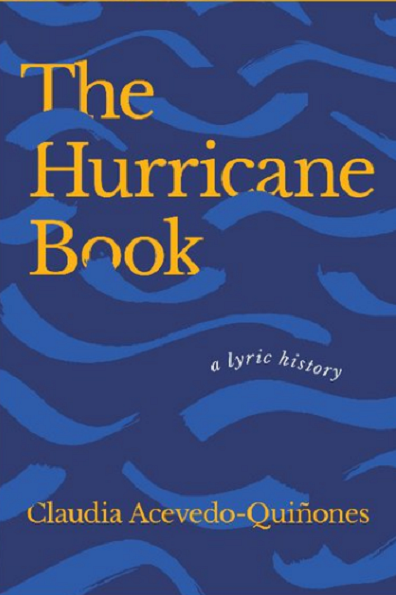
Here are excerpts from a review of The Hurricane Book: A Lyric History (Rose Metal Press 2023), a debut novel by Claudia Acevedo-Quiñones. The reviewer, Charles Rammelkamp, is Prose Editor for BrickHouse Books in Baltimore and Reviews Editor for The Adirondack Review, and author of Mortal Coil and A Magician Among the Spirits. [See full review at Compulsive Reader. See previous post New: The Hurricane Book. Many thanks to Peter Jordens for bringing this item to our attention.]
The Hurricane Book: A Lyric History
Rose Metal Press
October 2023, $15.95, 160 pages, ISBN: 978-1-941628-31-7
In the vignette, “Trenton Makes, the World Takes,” Claudia Acevedo-Quiñones writes, “If I was a house, I was a crumbling one, gothic-style, with a woman in the attic waiting to set fire to it all.” It comes in the final of the six sections of The Hurricane Book, a lyrical memoir wrapped in history and poetry. The Hurricane Book is organized around the hurricanes that have affected Puerto Rico in the last ninety years, proceeding chronologically from 1928’s Hurricane San Felipe II to 2017’s Hurricane Maria. As Acevedo-Quiñones writes in the “Author’s Note” that introduces the narrative, she begins each section with “historical facts about that era in Puerto Rico and factual details about the hurricane. I then tied my family and personal history to the same eras and hurricanes.” It is a story of (provisional) personal redemption, resulting in this book.
She also writes in the “Author’s Note” that more than a personal memoir, she wanted to shine a light on the uncertainty and trauma of Puerto Rico’s history of colonialism and its dire consequences. Indeed, in 1937 the United States began a program of forced sterilization of poor women of childbearing age, pushing them into getting tubal ligations. By 1976, over 37% of them had been sterilized. Puerto Rico has also been the laboratory site for military weapons testing. Further, financial mismanagement and unfair tax policies have resulted in a Puerto Rican diaspora, such that the population of the island has actually decreased while the unemployment rate is higher than in the mainland United States. By 2017, she reports, “there were 5.6 million Puerto Ricans in the U.S. and 3.3 million on the island.” The author is part of the diaspora.
Acevedo-Quiñones includes family trees and freely admits that some of her facts are speculation, sometimes pieced together from “drunken spill sessions,” hearsay, half-remembered conversations. “Secrets are our family members, too,” after all, as she wisely points out in the vignette, “Secreto.” Her paternal great-grandfather Leonardo spent most of his life in prison for homicide; he killed a neighbor for propositioning his son. In “Rock River,” Acevedo-Quiñones mentions a great-grandmother, on her mother’s side who re-married after her first husband died and had a daughter by that marriage “who loved The Monkees and married a guy she met at a stoplight.” Some of her family anecdotes have the delightful aura of gossip. But most of the family history centers on her grandparents, Pedro (“Buelo”) and Isolina (“Beba”), and her parents. In “Neil Armstrong,” from the Hurricane San Ciprián section, she tells us that her grandfather was 32 when he married her grandmother, who was 15 or 16.
The hurricanes around which she weaves her narrative are Hurricane San Felipe II (1928), Hurricane San Ciprián (1932), Hurricane Hugo (1989), Hurricane Georges (1998), Hurricane Sandy (2012) and Hurricane Maria (2017). Acevedo-Quiñones was a child during Hugo, and the memories become more personal. [. . .]
In the Hurricane Georges section she describes the contents of the emergency backpacks that she and all Puerto Ricans learned to have handy. It’s a metaphor for her own life strategies of escape and survival.
When her family life in Puerto Rico becomes just too harrowing (her bipolar mother was hospitalized after several harrowing episodes and drunken binges; her philandering father was not the most reliable of caregivers), Acevedo-Quiñones flees to New York. Her life in the United States is chaotic, but she perseveres. She is living in Princeton, New Jersey, during Hurricane Sandy (aka, “Superstorm Sandy”), which is when her beloved Beba dies back home in Puerto Rico.
Acevedo-Quiñones has reached rock bottom when Hurricane Maria occurs. [. . .]
The Hurricane Book is a compelling story, created and seamlessly bound together through various literary techniques and styles.
For full review, see https://compulsivereader.com/2023/10/12/a-review-of-the-hurricane-book-by-claudia-acevedo-quinones
Read interviews of the author at https://www.pw.org/content/ten_questions_for_claudia_acevedoquinones and https://www.full-stop.net/2023/11/28/interviews/alana-mohamed/claudia-acevedo-quinones
See author’s page at https://www.cacevedoquinones.com/
Here are excerpts from a review of The Hurricane Book: A Lyric History (Rose Metal Press 2023), a debut novel by Claudia Acevedo-Quiñones. The reviewer, Charles Rammelkamp, is Prose Editor for BrickHouse Books in Baltimore and Reviews Editor for The Adirondack Review, and author of Mortal Coil and A Magician Among the Spirits. [See full








